
Juan Luis Guerra Seijas is a Dominican musician, singer, composer, and record producer. He has sold 30 million records worldwide, making him one of the best-selling Latin music artists. Throughout his career, he has won numerous awards including 23 Latin Grammy Awards, three Grammy Awards, and one Latin Billboard Music Award. Guerra won 3 Latin Grammy Awards in 2010, including Album of the Year. In 2012, he won the Latin Grammy Award for Producer of the Year.

Para Ti is the ninth studio album by singer-songwriter Juan Luis Guerra and his band 4.40. It was released on August 31, 2004, by Vene Music and distributed by Universal Latin Music. It was his first studio album in six years since Ni es lo mismo ni es igual (1998) and is his first Christian-gospel inspired album. The lyrics are inspired by his conversion to Christianity and his experience of been a born again Christian. The album explores music genres from gospel and ballads to the salsa and merengue. The album was supported by the release of three official singles: "Para Ti", "Las Avispas" and "Dinteles".

Bachata Rosa is the fifth studio album by Dominican singer-songwriter Juan Luis Guerra and his group 4.40. It was released on December 11, 1990, by Karen Records. It brought bachata music into the mainstream in the Dominican Republic and gave the genre an international audience. A Portuguese version of the record was released in 1992 under the title Romance Rosa; it was certified gold in Brazil. The album received a Grammy Award for Best Tropical Latin Album and two Lo Nuestro Awards for Tropical Album of the Year and Tropical Group of the Year.

Ojalá Que Llueva Café is the fourth studio album by Dominican singer-songwriter Juan Luis Guerra released in 1989 by Karen Records. It is considered one of his most emblematic and important albums. The album set the musical path for his later albums, re-formulating Dominican merengue and bachata music through the contemporary elements of pop, rock, salsa, or jazz. Incorporating socially conscious lyrics with danceable merengues and romantic-poetic bachatas, the album is considered one of the most important albums of his discography.

Fogaraté! is the seventh album of the famous Dominican songwriter and musician Juan Luis Guerra. It was released on July 19, 1994. The album mixed a variety of music genres including rural and flolklroic rots of merengue called "Perico Ripao" with elements of African soukus music and Tropical Music such as Reggae with the collaboration of African guitarist Diblo Dibala and Dominican accordionist Francisco Ulloa, along with Son, Bachata and Salsa. Also, the album features a particular, bachata-styled adaptation of the Lacrimosa movement from Mozart's Requiem Mass in D Minor and Guerra's first song fully in English "July 19". Exploring lyrics and themes about magical realism of Latin American literature and commenting on the politics of the Caribbean, for many fans and critics, Fogaraté! is one of his most musically complex album.
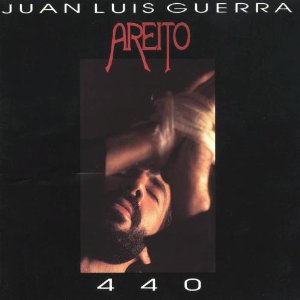
Areíto is the sixth album by Juan Luis Guerra with his band 440, released on December 8, 1992, by Karem Records. The album, meant to be a tribute to the indigenous tribes of the Dominican Republic, is named after a dance that the aboriginal inhabitants of the Greater Antilles (Taínos) accompanied with songs during their festivals and religious rites. The album contains twelve tracks including "Cuando te Beso", interpret by Santo Domingo Philharmonic Orchestra. Congolese musician Diblo Dibala played guitar on the song "El Costo de la Vida", which was a Spanish cover of his own soukous song "Kimia Eve", while the last track on the album, "Naboria daca, mayanimacaná", is sung in Arawak, the language of the Taíno people. Areíto was originally set to be released in early April 1992, but was first delayed to the end of October 1992 and was finally released on December 8, 1992.

Grandes Éxitos de Juan Luis Guerra y 440 or simply Grandes Éxitos is a compilation album of Dominican singer-songwriter Juan Luis Guerra, and his band 440 released in July 1995 by Karem Records. It contained Guerra's fifteen biggest hits from 1988 to 1994 on the original version and from the albums Mudanza y Acarreo(1985) to Fogarate! (1994) on the international versions. The compilation receive positive reviews by the critics.

Colección Romántica is the compilation album of the famous Dominican songwriter and musician Juan Luis Guerra and 4.40. It was released in November 21, 2000 and February 6, 2001 in the United States by Karen Records.It is a dual album compilation including 20 of the group's classic songs remastered and re-recorded as ballads. The album also contained unaltered original versions of their softer songs, like acoustic ballads or bachatas. It would become Guerra's last album released under the Dominican independent music label Karen Records, as his later albums would be released under Vene Music and subsequently under EMI music and Capitol Latin.
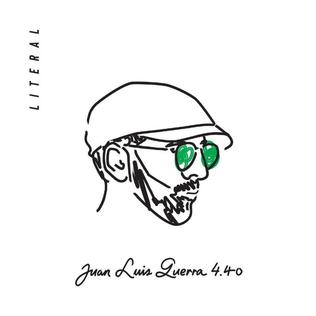
Literal is the 14th studio album by Dominican singer, songwriter and producer Juan Luis Guerra. It was released on 31 May 2019 by Universal Music Latin. Written and produced by Juan Luis Guerra, the album contains eleven tracks and encompasses a variety of tropical genres, such as 'Bachata, Merengue, Salsa and Son along with influences from Jazz, Gospel, Rock and Dominican Folklore music. The album was co-produced by Guerra's longtime collaboration and musical director Janina Rosado. It has lyrics about romance, love, nostalgia, moving on and protest against corruption.
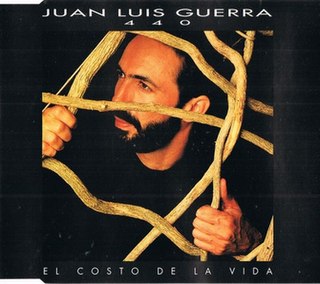
"El Costo de la Vida" is a song by Dominican Republic singer-songwriter Juan Luis Guerra released as the third single from his sixth studio album Areito (1992). The track is collaborated by the famous Congolese musician Diblo Dibala on guitar and is a Spanish cover of his own soukous song "Kimia Eve". The lyrics to the song make references to the poverty, corruption and low-life standards in Latin America. Also, lyrics about poor conditions in many Latin American countries, the celebration of the 'discovery' of America and the double standards of first-world nations. The music video was banned in several countries for been to graphic and sparked some controversy due to many considered the lyrics contained on the song had anti-capitalist tendencies.
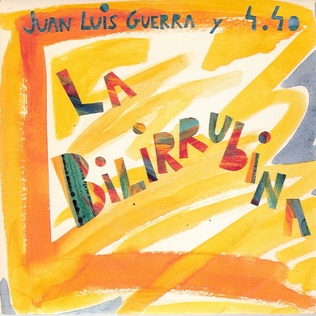
"La Bilirrubina" is a song by Dominican singer-songwriter Juan Luis Guerra. It was written by Guerra and released by Karem Records on 1990 and 1991 in Europe as the second single from his fifth studio album, Bachata Rosa. It was nominated for Record of the Year at 1991 Lo Nuestro Awards. The merengue track is considered one of Guerra's signature songs and most popular. It receive positive reviews and was listed one of the best tracks of the album.
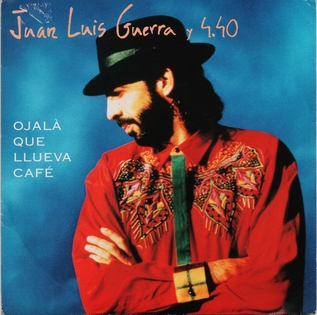
Ojala Que Llueva Cafe is the lead single by the Dominican artist Juan Luis Guerra and his band 4:40 from their fourth studio album of the same title. It was released on 1989 by Karem Records and 1990 in Europe by Ariola Records. The lyrics are a poetic metaphor about the poor conditions of the hard-working people residing in the countryside and the hope that the things are going be better someday in the future. Is one of Guerra’s signature songs and one of the first tracks to gain international attention in his career, peaking on the Billboard Hot Latin Tracks and Latin America airplay charts. The music video was ranked number one of the top 15 best music videos of all time by Dominican artists.

"Bachata Rosa" is a song by Dominican Republic singer-songwriter Juan Luis Guerra released in 1991 and served as the lead seventh and final from his fifth studio album Bachata Rosa (1990). Along with Estrellitas y Duendes and Como Abeja Al Panal, is one of Guerra's first international hits and helped to contributed to the bachata sophistication and have recognition in Latin America and Europe. The track was a commercial success, toping the airplay charts in Mexico and was the fourth single of the album to peak insade of the top 10 at the US Hot Latin Tracks.
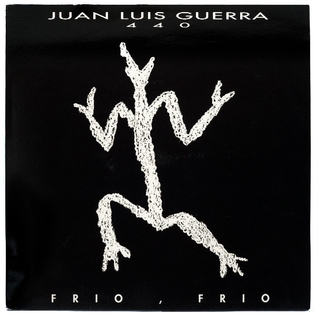
Frio Frio or Frio, Frio is the lead single of the sixth studio album Areito by Dominican superstar Juan Luis Guerra. The track is a bachata and was wrote based on a poem by Federico García Lorca and was released in August 1991. The track was receive positive reviews by the critics and was nominated for Tropical Salsa Song of the Year at the 4th Lo Nuestro Awards. Frio Frio was a success peaking at number 4 on Billboard Hot Latin Tracks and at the Top 5 airplay in Panama and Uruguay.

Señales de Humo is the second single of Juan Luis Guerra sixth studio album Areito (1992). The track is divided in two parts: The first part is a bachata and the second one the rhythm transformed to Mambo with elements of son and salsa. The title made reference of the communication that the indigenous use between vast and unpopulated areas and that are made by bonfires. The song met with critical acclaim and won Song of The Year at the 1994`s BMI Latin Awards. The track was a great success in Latin America and Billboard US Latin charts. The track was included on Guerra`s compilation album Colección Romantica (2001).
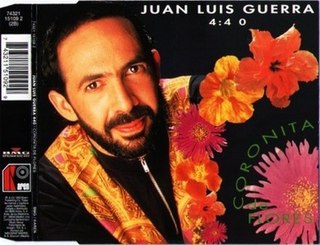
Coronita de Flores is the fifth single of Juan Luis Guerra sixth studio album Areito, released in 1993 by Karem Records. The song was written band produced by Juan Luis Guerra. The track received positive reviews due the musical structure of cha-cha and Bolero and was nominated for Tropical/Salsa Song of the Year at the 1994's Lo Nuestro Awards.

"Mal de Amor" is the fourth single from Juan Luis Guerra's sixth studio album Areíto, released in 1993 by Karem Records. The song was written and produced by Guerra. The track encompasses traditional merengue with Cumbia. The song was the fourth consecutive single from the album to reach the top-ten on the Billboard Hot Latin Songs chart in the United States. It also reached the top-ten in Venezuela.
Cuando Te Beso(English: When I kiss you) is the seventh and final single of Juan Luis Guerra sixth studio album Areito, released on 1993 in Europe and in January 1994 in the United States by Karem Records. The album also contained other version of the track performed by the Santo Domingo Philharmonic Orchestra. The song peaked at number 28 on the US Hot Latin Songs and reached the top-ten in Chile and Panama. The track receive positive reviews by the critics. Ramiro Burr from Austin American Statesman stated that track is "an affecting tale of devotion". Robert Hilburn from Los Angeles Times wrote that the track had percussion "had some wonderfully affecting ballad work".
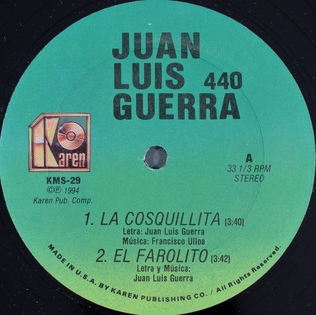
La Cosquillita is the lead single of the seventh studio album Fogarate! by dominican superstar Juan Luis Guerra. It was released on June 21, 1994 by Karen Records. The rural merengue track was written and produced with the Dominican accordionist Francisco Ulloa and his band. About the success of the track, Guerra stated "With the `perico ripiao' we are doing the same thing that we did with the `bachata,' breaking down the barriers that prevent it from reaching all of Dominican society, and then exporting it". The song became Guerra's first number-one hit in his native Dominican Republic; and became a top-ten hit in Spain, Venezuela and the US Hot Latin Songs chart.
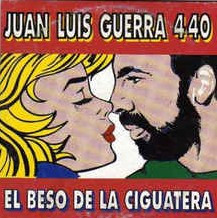
El Beso de la Ciguatera is a song by Dominican Republic singer-songwriter Juan Luis Guerra released as the third single for his album Fogarate (1994) with the collaboration of Diblo Dibala. The song was released in January 23, 1995 by Karen Records. The track encompasses merengue with soukus. The song was a recipient of a Broadcast Music, Inc. (BMI) Latin Award in 1996. Commercially, it reached the top ten on the Billboard Hot Latin Songs and Tropical Airplay charts in the United States. It also received moderate airplay in Europe.












